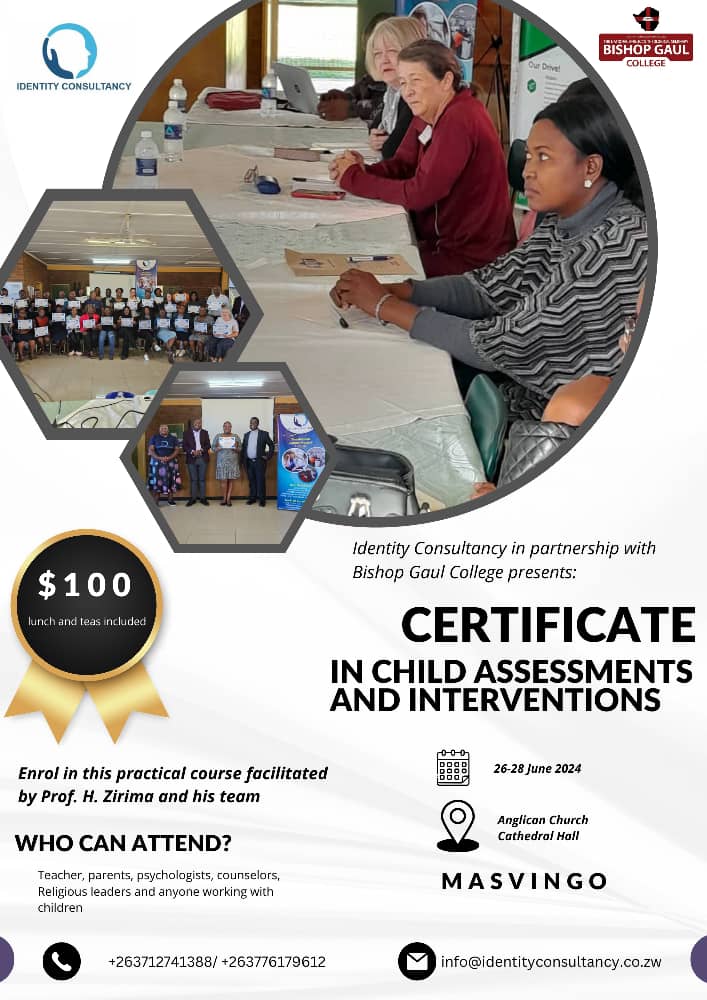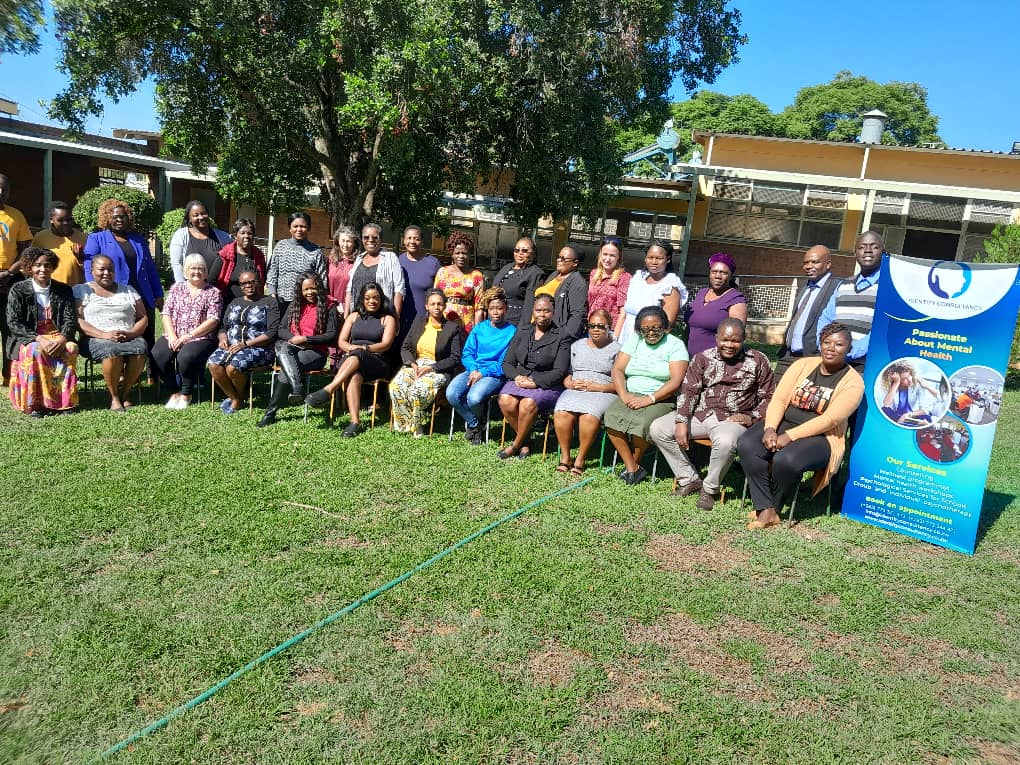In Zimbabwe, as in many other countries worldwide, ensuring the holistic development and well-being of children is a paramount concern. However, amidst various socio-economic challenges, including limited resources and infrastructure, effective assessment and intervention for children facing developmental, behavioral, or educational difficulties remain a significant challenge. Recognizing the crucial role that early identification and targeted interventions play in mitigating these challenges, there is an increasing call for comprehensive training programs focused on child assessments and interventions.
The title “Unlocking Potential: Bridging Gaps with Child Assessments and Intervention Training in Zimbabwe” encapsulates the essence of this discourse. It emphasizes the transformative power of equipping professionals with the necessary skills and knowledge to identify, assess, and intervene effectively to support children’s growth and development. This introduction delves into the critical need for such training initiatives within the Zimbabwean context, highlighting the multifaceted benefits they offer to individuals, communities, and the nation as a whole.
Furthermore, the healthcare system in Zimbabwe is under-resourced and overstretched, making it difficult to provide adequate care for all children. The country faces a shortage of healthcare professionals, including pediatricians and child psychologists, exacerbating the problem (Zimbabwe Ministry of Health and Child Care, 2021). This situation is compounded by a lack of training in child-specific healthcare needs, particularly in the area of developmental and behavioral assessments.
Education is another critical area where Zimbabwean children face challenges. The quality of education in the country varies widely, with children in rural areas particularly disadvantaged due to inadequate school facilities, a lack of trained teachers, and insufficient educational materials (Zimbabwe National Statistics Agency, 2020). Additionally, learning disabilities and other developmental disorders often go unrecognized and unsupported in the classroom, leading to poor educational outcomes and high dropout rates.
To address these distressing issues effectively, it is imperative that Zimbabwe invest in robust child assessments and intervention training. Such training would equip healthcare providers, educators, and social workers with the skills and knowledge necessary to identify developmental disorders and other issues early. Early detection is crucial as it allows for timely and appropriate interventions, which can significantly improve outcomes for affected children.

Investing in child assessments and interventions training would not only ensure the early detection and prevention of developmental disorders but also enable timely interventions that can shape a brighter future for Zimbabwe’s youth. Early and accurate diagnosis of conditions such as autism spectrum disorder, attention deficit hyperactivity disorder (ADHD), and learning disabilities can lead to tailored interventions that address each child’s specific needs (American Academy of Pediatrics, 2020). Moreover, such training would enhance the ability of professionals to support children who have experienced trauma, abuse, and neglect, providing them with the necessary care and resources to heal and thrive.
Early Identification of Developmental Disorders
Early identification of developmental disorders is paramount for ensuring timely intervention and support for affected children. By recognizing signs and symptoms in the early stages of development, professionals can initiate appropriate assessments and interventions tailored to each child’s unique needs. This proactive approach not only enables the mitigation of potential challenges but also promotes optimal outcomes in various domains, including cognitive, social, and emotional development. Furthermore, early identification facilitates early intervention services, which have been shown to significantly enhance long-term outcomes and reduce the overall burden of developmental disorders on individuals, families, and society. Therefore, prioritizing efforts to improve early identification processes through comprehensive training and awareness initiatives is essential for maximizing the potential of every child and fostering inclusive environments where all children can thrive.
Child assessments play a crucial role in identifying and diagnosing developmental disorders, which is essential for the well-being and optimal development of children. These assessments involve thorough examinations and evaluations that enable professionals to detect conditions such as autism spectrum disorder (ASD), attention deficit hyperactivity disorder (ADHD), learning disabilities, and cognitive impairments.
Importance of Child Assessments
Child assessments play a pivotal role in understanding the unique strengths, challenges, and developmental trajectories of individual children. By systematically evaluating various aspects of a child’s development, including cognitive, social, emotional, and physical domains, assessments provide valuable insights into their overall well-being and functioning. Importantly, assessments enable professionals to identify any areas of concern or potential developmental delays early on, allowing for timely intervention and support. Moreover, thorough assessments help in tailoring interventions and educational strategies to meet the specific needs of each child, thereby maximizing their potential for growth and success.
Additionally, assessments contribute to informed decision-making processes, guiding parents, educators, and policymakers in allocating resources and implementing evidence-based practices that promote positive outcomes for children. In essence, the importance of child assessments lies in their ability to inform targeted interventions, facilitate early identification of developmental needs, and ultimately empower children to reach their full potential.

Early identification through child assessments helps in recognizing various developmental disorders at a stage when interventions can be most effective. Developmental disorders, if left undiagnosed and untreated, can lead to long-term challenges in education, social interactions, and overall quality of life. For instance, autism spectrum disorder (ASD) is characterized by difficulties in social communication and repetitive behaviors, which, if not addressed early, can hinder a child’s ability to integrate into mainstream education and society (Lord et al., 2020).
Similarly, attention deficit hyperactivity disorder (ADHD) affects a child’s ability to concentrate, stay organized, and control impulses, which can lead to academic underachievement and behavioral issues (American Psychiatric Association, 2013). Learning disabilities, such as dyslexia and dyscalculia, also pose significant challenges, as they interfere with a child’s ability to read, write, and perform mathematical operations, impacting their academic progress (Shaywitz & Shaywitz, 2008).
Benefits of Investing in Child Assessments Training
Investing in child assessments training yields multifaceted benefits that extend far beyond individual children to encompass families, communities, and society as a whole. Firstly, trained professionals equipped with comprehensive assessment skills can identify developmental delays and challenges early on, facilitating timely intervention and support services. This early identification not only improves outcomes for children but also reduces the overall burden on families and the healthcare system by addressing issues proactively. Moreover, investing in child assessments training enhances the quality of services provided to children, ensuring that interventions are evidence-based, culturally sensitive, and tailored to individual needs. Additionally, trained professionals can collaborate more effectively with families, educators, and other stakeholders, fostering a holistic approach to child development and well-being. Furthermore, by promoting early intervention and supporting children’s optimal development, investments in child assessments training contribute to long-term societal benefits, including improved educational attainment, enhanced workforce productivity, and reduced disparities in health and social outcomes. In essence, the benefits of investing in child assessments training are far-reaching, encompassing improved outcomes for children, families, and society at large.
The Role of Child Assessments and Interventions
The role of child assessments and interventions is pivotal in ensuring the holistic development and well-being of children. Assessments serve as a cornerstone for understanding each child’s unique strengths, challenges, and developmental needs across various domains. By systematically evaluating cognitive, social, emotional, and physical aspects of development, professionals can identify potential areas of concern early on, enabling timely intervention and support. Interventions, informed by evidence-based practices and tailored to individual needs, play a crucial role in addressing identified challenges and promoting positive outcomes. Through collaboration with families, educators, and community resources, professionals can implement holistic intervention plans that support children’s growth and maximize their potential. Ultimately, the role of child assessments and interventions extends beyond individual children to encompass broader societal benefits, including improved educational attainment, enhanced social functioning, and reduced disparities in health and academic outcomes.
Take away
Unlocking Potential: Bridging Gaps with Child Assessments and Interventions Training in Zimbabwe highlights the imperative need for comprehensive training programs focused on child assessments and interventions within the Zimbabwean context. This initiative aims to equip professionals with the necessary skills and knowledge to identify, assess, and intervene effectively to support children’s growth and development. By addressing existing challenges and gaps in the current landscape of child development services, this training program seeks to empower professionals to provide timely and targeted support for children facing developmental, behavioral, or educational difficulties. Ultimately, the training endeavors to unlock the full potential of Zimbabwean children, fostering a brighter future for individuals, communities, and the nation as a whole.
Wisdom from Masvingo
“Within every child lies a world of untapped potential waiting to be unlocked. Through dedicated training in child assessments and interventions, we don’t just bridge gaps; we build bridges to brighter futures. Unlocking potential is more than a task; it’s a noble pursuit, a commitment to the future. By bridging gaps with dedicated training in child assessments and interventions, we embark on a transformative journey. In Zimbabwe, this endeavor holds the promise of not just addressing challenges, but of nurturing a generation of resilient, empowered individuals. Let us embrace this opportunity to invest in our children’s growth, for in doing so, we sow the seeds of a brighter, more inclusive tomorrow.”



Leave a Reply